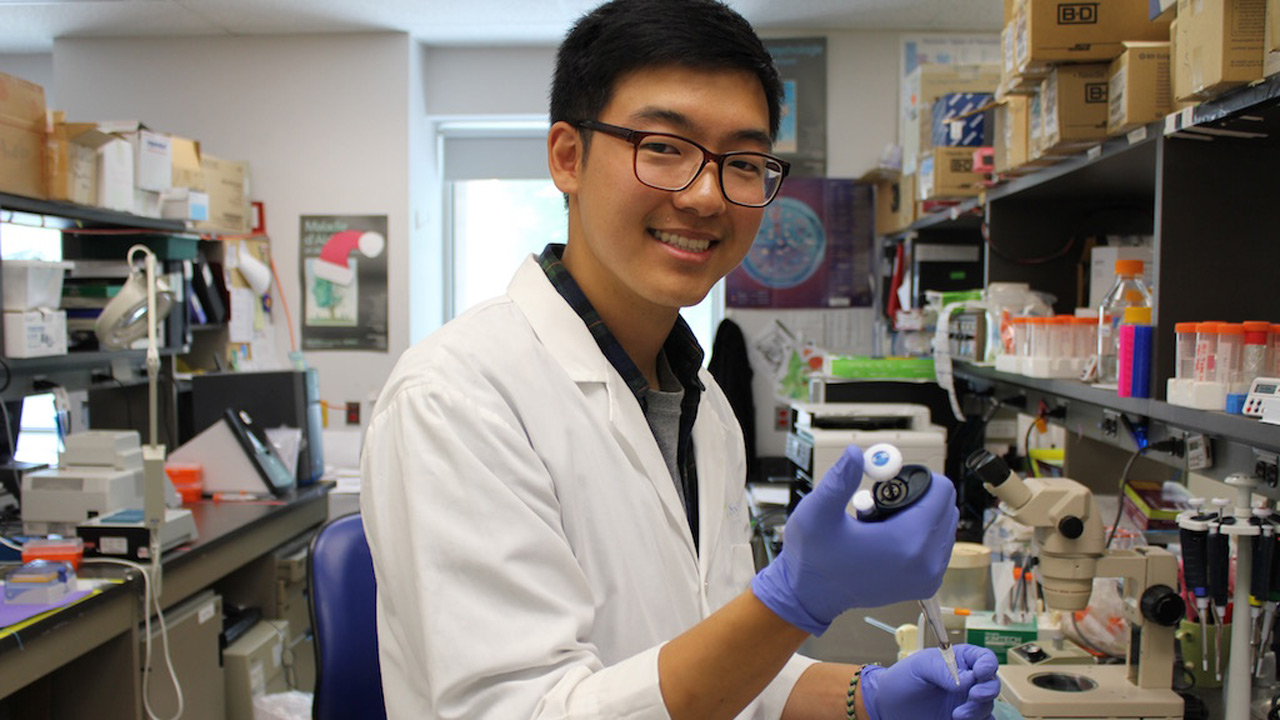The right manoeuvre
James Kim wasn’t sure if a career in research was right for him, but a studentship in the lab of Sunnybrook Research Institute (SRI) senior scientist Dr. Isabelle Aubert changed that.
“Because of the experience I gained here I found out grad school was right for me,” says Kim, who graduated from the University of Toronto this past spring. “I was really lucky because I had a lot of independence to do my own research and was able to suggest different experiments. I got a good sense of how it would be in grad school.”
Kim will hit the ground running when he begins his PhD at U of T this fall. He began working in Aubert’s lab during his fourth year of undergrad for a research project that was part of his specialist program in pathobiology. He is continuing his work through this year’s D+H SRI Summer Student Research Program, where he is analyzing the effects of immunotherapy in preclinical models of Alzheimer’s disease (AD).
Aubert, whose focus is on the biology of brain repair, collaborates with Dr. Kullervo Hynynen, SRI’s director of Physical Sciences, on treatment of brain disorders such as AD. They have delivered antibodies directly into the brains of mice with AD using focused ultrasound to open the blood-brain barrier. The barrier, which protects the brain from harmful substances in the blood, also makes it impervious to most treatment by blocking the passage of nearly all small and large molecules into the brain. Using this technique Aubert and Hynynen have decreased the amyloid plaques that characterize AD and improved cognition in preclinical models of the disease.
Kim’s research builds on this work by examining how antibodies delivered to the brain using focused ultrasound interact with the immune system of mice with AD. He is studying the expression of inflammatory proteins in the brain as the disease progresses, and how the levels of these proteins change with treatment. “What we’re hoping to see is that our treatment can modulate the inflammation that is normally seen in Alzheimer’s disease, and hopefully alleviate morbidity of the disease,” says Kim.
He uses polymerase chain reaction (PCR), a method that is a staple of molecular biology; it efficiently makes millions of copies of a small segment of DNA. The “amplified” DNA generated by the technique, which enables diagnosis of disease and detection of bacteria or viruses, allows Kim to study gene expression of inflammatory markers. To replicate genetic material using PCR, Kim had to design “primers,” short pieces of DNA that matched the DNA segment he wanted to copy. “It required plenty of troubleshooting with the help of scientific literature,” says Kim.
He also performed immunofluorescence to study the expression of proteins in the hippocampus, a brain region responsible for memory and spatial navigation. The technique uses light microscopy and a fluorescent dye to mark proteins of interest to visualize processes within the cell.
In addition to the technical expertise gained on the job, Kim says the feedback he received from the group has honed his presentation skills, which will also be useful to him as a researcher. “I feel a lot more confident and comfortable speaking in front of others about my research,” he says.
He describes the lab as a “family” and says talking to Aubert’s graduate students about their experiences helped him decide to do his PhD. Another perk: being able to walk to work. Kim resides in the Toronto neighbourhood of Leaside, where Sunnybrook Research Institute is located. He grew up there and scrimmaged with the Leaside Lancers high school football team. He reflects on how things have come full circle. “Back [then], I don't think I would have ever predicted being where I am today,” he says. “I was hooked from the moment I started working in a lab, where I could apply what I learned in classrooms to discover things that no one knew, and to be a part of research in cutting-edge technology like focused ultrasound is really exciting.”
James Kim received a D+H SRI Summer Studentship Award.






